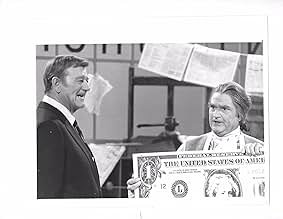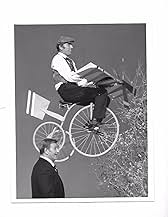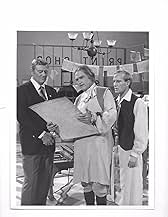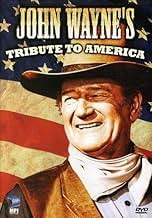Adicionar um enredo no seu idiomaJohn Wayne and an all-star cast tell the story of America.John Wayne and an all-star cast tell the story of America.John Wayne and an all-star cast tell the story of America.
- Ganhou 1 Primetime Emmy
- 1 vitória e 1 indicação no total
Lucille Ball
- Statue of Liberty
- (narração)
- Direção
- Roteiristas
- Elenco e equipe completos
- Produção, bilheteria e muito mais no IMDbPro
Avaliações em destaque
...and yes, it was theme park quality song-and-dance, variety show with a history outline. But it was not meant to be anything else. It was entertainment. PBS has done more "serious" in-depth, and well-researched history TV documentaries in later years as have the History channel, A & E, etc. But please note that these are just as much entertainment for audiences, otherwise the ratings wouldn't be there, the audience would not be there, and the motivation for the makers (at least enough money to live on) would not be there to make them. I remember this and others like it fondly, perhaps through rose-colored glasses of remembrance. But I also remember (and I don't know why this has stuck in my strange memory) that when it came to a Civil War section some mention was made of current racial unrest and the continuing themes of equality.
I would enjoy seeing it again if only for a glimpse of the celebrities that are gone and seeing a time when such did not hesitate to say patriotic things for fear of being hissed at.
I would enjoy seeing it again if only for a glimpse of the celebrities that are gone and seeing a time when such did not hesitate to say patriotic things for fear of being hissed at.
10friedmad
For many years, the wonderful montage of each guest singing a line from "God Bless America" stayed with me. I managed to find a cassette of the show and got chills watching it again. They don't make shows like this anymore...I can't imagine a group of today's stars so large who I'd care to see at all. What would it take to get this special seen on TV again? In our post-9/11 world, it would be a nostalgic reminder of a generation that APPRECIATED where we came from, and what LIBERTY and FREEDOM are all about. To anyone reading this who may own the rights to this special, bring it back on video and you'll find a very receptive public.
Purchased this at Wal-Mart for under $10.00 and it's worth every cent. Too bad more Variety specials aren't available on DVD.
This show isn't meant to be a 'written in stone' history lesson. It's just what the title suggests: "Swing Out, Sweet Land". Maybe because it is hosted by John Wayne that so many of his contemporary thespians are in this or because of just about every big name on NBC at the time, but I found it quite enjoyable.
I had heard of this special before seeing it because it is mentioned during an episode of my favorite show "All in the Family." So when I saw this I had to have it just to see what I had missed all those years ago (I was only nine and never had control of what to watch). Since they don't produce specials anymore I loved watching all the corny sketches and sincere songs; seeing all the true "stars" of days gone bye having a bit of fun. That's what "SO,SL" was too - fun with just a dash of patriotic preaching that is so politically incorrect these days. And that's a shame we've moved in that direction.
This show isn't meant to be a 'written in stone' history lesson. It's just what the title suggests: "Swing Out, Sweet Land". Maybe because it is hosted by John Wayne that so many of his contemporary thespians are in this or because of just about every big name on NBC at the time, but I found it quite enjoyable.
I had heard of this special before seeing it because it is mentioned during an episode of my favorite show "All in the Family." So when I saw this I had to have it just to see what I had missed all those years ago (I was only nine and never had control of what to watch). Since they don't produce specials anymore I loved watching all the corny sketches and sincere songs; seeing all the true "stars" of days gone bye having a bit of fun. That's what "SO,SL" was too - fun with just a dash of patriotic preaching that is so politically incorrect these days. And that's a shame we've moved in that direction.
Even those who aren't fans of John Wayne would probably still enjoy this series of vignettes that Wayne narrates almost like the Stage Manager in "Our Town," stepping from era to era through a few centuries of American history. Wayne had been burned in his earliest foray into television nearly two decades earlier: Making a guest appearance on a variety show in 1953 while his movie "Hondo" was in theatres, he was supposed to act like he didn't know why the audience was reacting, and then every time he turned around he'd press a button in his pants and a sign on his back would light up to say "Hondo." The indignity of the appearance embarrassed him enough so that, except for rare guest appearances on shows like "I Love Lucy," Wayne avoided television for most of the next 20 years. "Swing Out, Sweet Land" gave him a chance to show his unabashed red-white-and-blue sentiments and to feel far more comfortable in front of the television cameras.
Still, although it's an enjoyable and a somewhat tongue-in-cheek television special, sticking to many of the clichés of the American history genre, it's also very much a curio of its era -- when you could spend a couple of hours recounting those clichés as history, and also present them by featuring a raft of then-current celebrities often doing their own shtick as a counterpoint to the history -- Jack Benny (of course!) finding the silver dollar that Washington threw across the Delaware; Roy Clark as a banjo player at Andy Jackson's funeral; even Rowan and Martin as the Wright Brothers! You won't find the kind of insight that Ken Burns puts forth on his PBS series, certainly . . . and, as history, perhaps its most poignant feature is realizing just how many of the folks who were well-known at that time (like Wayne himself, Benny, Lucille Ball, Bing Crosby, Lorne Greene, Michael Landon, Greg Morris, and even Ricky Nelson) are themselves already gone.
Still, although it's an enjoyable and a somewhat tongue-in-cheek television special, sticking to many of the clichés of the American history genre, it's also very much a curio of its era -- when you could spend a couple of hours recounting those clichés as history, and also present them by featuring a raft of then-current celebrities often doing their own shtick as a counterpoint to the history -- Jack Benny (of course!) finding the silver dollar that Washington threw across the Delaware; Roy Clark as a banjo player at Andy Jackson's funeral; even Rowan and Martin as the Wright Brothers! You won't find the kind of insight that Ken Burns puts forth on his PBS series, certainly . . . and, as history, perhaps its most poignant feature is realizing just how many of the folks who were well-known at that time (like Wayne himself, Benny, Lucille Ball, Bing Crosby, Lorne Greene, Michael Landon, Greg Morris, and even Ricky Nelson) are themselves already gone.
'Swing Out, Sweet Land' is the deeply annoying title of a variety special that's actually fairly entertaining. Because this special allegedly has something to do with American history, IMDb have listed it as a 'documentary'. Actually, this is a comedy/variety special that presents a series of skits (most of them attempting to be funny, a few of them serious) with modern actors impersonating figures from American history. Oddly, two of the U.S. Presidents depicted here are played by Canadian actors: Lorne Greene as Washington, William Shatner as John Adams. The whole affair was a personal project of John Wayne, and was produced by his company Batjac Productions.
I attended a press screening of this special in London in 1971. A Batjac rep was hoping to persuade British TV producers (one of them my employer) to buy the UK syndication rights. Unsurprisingly, British TV producers were chary to give British audiences a programme dealing entirely with American history, much of it concerning America's War of Independence against Britain. 'Swing Out, Sweet Land' was never transmitted in the UK.
CONTAINS SPOILERS. Most of the humour here is simple displacement of 1970s showbiz personalities into earlier eras. Bob Hope shows up in a tricorn at Valley Forge for Christmas 1776, doing his usual shtick of entertaining the troops (who look surprisingly well-fed, well-dressed and warm ... in what's clearly an indoor set). Ann-Margret, in a mob cap and petticoats, does a dance routine for the enthusiastic soldiers, lifting her skirts surprisingly high for the 18th century. Then Bob Hope sings his usual 'Thanks for the Memories', with Revolution-era lyrics: 'We all hold very dear / that patriot Revere. / He rode all night to aid our plight, but just think of his ... rear!' On the word 'rear', Hope pauses slightly and he gooses Ann-Margret, and she squeals in delight! That's the biggest surprise here.
Phyllis Diller shows up as Belva Lockwood, the first woman to stand for election as U.S. President (1884 & 1888), and also the first woman lawyer to plead a case before the Supreme Court. Unfortunately, Diller's turn here is treated largely as a joke. In fairness to Diller, Belva Lockwood's political campaigns were largely regarded as a joke in the 1880s.
Lorne Greene, in elaborate costume and wig, is seen as President Washington. As he walks away from his advisors, he is confronted by Jack Benny in 18th-century costume but wearing his usual hornrims. Benny tentatively asks Washington if the rumour is true that he once threw a dollar across the Potomac. When Washington confirms this, Benny nervously asks if Washington would be able to identify the dollar. When Washington answers in the negative, Benny replies: 'Good. So I can keep this one, then.' Ha bloody ha.
Dean Martin shows up as the inventor of the cotton gin, just so he can drunkenly belch 'Keep yer cotton-pickin' hands off my gin.' The rule in this special tends to be that white figures in American history will be mocked for cheap laughs, but black figures in American history will be depicted respectfully (though not always effectively).
The most bizarre turn is a dead-earnest skit featuring Red Skelton as a newspaper printer in Philadelphia in 1776, with Tom Smothers as his assistant; I leave it to you to imagine how these two actors look in 18th-century work clothes. They've been hired to run off copies of a new document called the Declaration of Independence. Smothers nervously feels that perhaps they shouldn't print this document; it defies King George, and it might just stir up trouble. Skelton reads off a few passages of the galley proof -- something about freedom and liberty -- and he hands it to Smothers with the verdict 'Print it.' Much as I admire John Wayne's sentiments in producing 'Sing Out, Sweet Land', I found this sequence extremely sententious and a little too pleased with its own boldness. I still have the press kit from the London screening I attended. The text in the press kit attempts to make a great deal of the fact that conservative John Wayne and liberal Tom Smothers had divergent political beliefs, yet were able to work together amicably to make this special. Right, so what? Tom Smothers is a member of the establishment, even if he pretends otherwise, and he wasn't going to rock the boat to compromise this special. The press kit mentions that Wayne and Smothers got along just fine during rehearsals by avoiding politics altogether. 'We talked about sailing,' Smothers is quoted in the press kit.
There's really nothing of great interest in 'Swing Out, Sweet Land' unless you're a fan of one of the performers in this cast ... and even then you'd have to be a completist. The comedy here isn't especially funny. As for the serious stuff: I'd be delighted to watch a special that gives respectful tribute to the subject of America's greatness ... but this special ain't it. I'll rate 'Sing Out, Sweet Land' 4 out of 10, purely for its novelty value.
I attended a press screening of this special in London in 1971. A Batjac rep was hoping to persuade British TV producers (one of them my employer) to buy the UK syndication rights. Unsurprisingly, British TV producers were chary to give British audiences a programme dealing entirely with American history, much of it concerning America's War of Independence against Britain. 'Swing Out, Sweet Land' was never transmitted in the UK.
CONTAINS SPOILERS. Most of the humour here is simple displacement of 1970s showbiz personalities into earlier eras. Bob Hope shows up in a tricorn at Valley Forge for Christmas 1776, doing his usual shtick of entertaining the troops (who look surprisingly well-fed, well-dressed and warm ... in what's clearly an indoor set). Ann-Margret, in a mob cap and petticoats, does a dance routine for the enthusiastic soldiers, lifting her skirts surprisingly high for the 18th century. Then Bob Hope sings his usual 'Thanks for the Memories', with Revolution-era lyrics: 'We all hold very dear / that patriot Revere. / He rode all night to aid our plight, but just think of his ... rear!' On the word 'rear', Hope pauses slightly and he gooses Ann-Margret, and she squeals in delight! That's the biggest surprise here.
Phyllis Diller shows up as Belva Lockwood, the first woman to stand for election as U.S. President (1884 & 1888), and also the first woman lawyer to plead a case before the Supreme Court. Unfortunately, Diller's turn here is treated largely as a joke. In fairness to Diller, Belva Lockwood's political campaigns were largely regarded as a joke in the 1880s.
Lorne Greene, in elaborate costume and wig, is seen as President Washington. As he walks away from his advisors, he is confronted by Jack Benny in 18th-century costume but wearing his usual hornrims. Benny tentatively asks Washington if the rumour is true that he once threw a dollar across the Potomac. When Washington confirms this, Benny nervously asks if Washington would be able to identify the dollar. When Washington answers in the negative, Benny replies: 'Good. So I can keep this one, then.' Ha bloody ha.
Dean Martin shows up as the inventor of the cotton gin, just so he can drunkenly belch 'Keep yer cotton-pickin' hands off my gin.' The rule in this special tends to be that white figures in American history will be mocked for cheap laughs, but black figures in American history will be depicted respectfully (though not always effectively).
The most bizarre turn is a dead-earnest skit featuring Red Skelton as a newspaper printer in Philadelphia in 1776, with Tom Smothers as his assistant; I leave it to you to imagine how these two actors look in 18th-century work clothes. They've been hired to run off copies of a new document called the Declaration of Independence. Smothers nervously feels that perhaps they shouldn't print this document; it defies King George, and it might just stir up trouble. Skelton reads off a few passages of the galley proof -- something about freedom and liberty -- and he hands it to Smothers with the verdict 'Print it.' Much as I admire John Wayne's sentiments in producing 'Sing Out, Sweet Land', I found this sequence extremely sententious and a little too pleased with its own boldness. I still have the press kit from the London screening I attended. The text in the press kit attempts to make a great deal of the fact that conservative John Wayne and liberal Tom Smothers had divergent political beliefs, yet were able to work together amicably to make this special. Right, so what? Tom Smothers is a member of the establishment, even if he pretends otherwise, and he wasn't going to rock the boat to compromise this special. The press kit mentions that Wayne and Smothers got along just fine during rehearsals by avoiding politics altogether. 'We talked about sailing,' Smothers is quoted in the press kit.
There's really nothing of great interest in 'Swing Out, Sweet Land' unless you're a fan of one of the performers in this cast ... and even then you'd have to be a completist. The comedy here isn't especially funny. As for the serious stuff: I'd be delighted to watch a special that gives respectful tribute to the subject of America's greatness ... but this special ain't it. I'll rate 'Sing Out, Sweet Land' 4 out of 10, purely for its novelty value.
Você sabia?
- CuriosidadesAt least two of the stars are from Canada: Lorne Greene and William Shatner.
- ConexõesReferenced in Tudo em Família: Writing the President (1971)
Principais escolhas
Faça login para avaliar e ver a lista de recomendações personalizadas
Detalhes
- Data de lançamento
- País de origem
- Idioma
- Também conhecido como
- John Wayne's Tribute to America
- Locações de filme
- Bodie State Historic Park, Califórnia, EUA(ghost town)
- Empresas de produção
- Consulte mais créditos da empresa na IMDbPro
Contribua para esta página
Sugerir uma alteração ou adicionar conteúdo ausente























